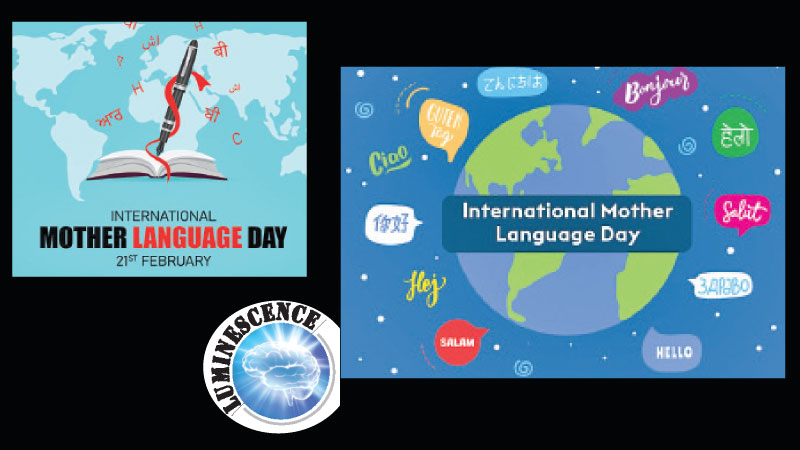Every year, on February 21, the world observes International Mother Language Day, a day dedicated to celebrating linguistic diversity and the importance of one’s first language. In Sri Lanka, much of the discourse surrounding language often revolves around English—its necessity, advantages, and role as a global connector.
 Without a doubt, English is an essential tool for education, career growth, and international communication. However, in our pursuit of mastering a second language, have we, at times, neglected the true essence of our mother tongue?
Without a doubt, English is an essential tool for education, career growth, and international communication. However, in our pursuit of mastering a second language, have we, at times, neglected the true essence of our mother tongue?
While English may be a bridge to the world, our mother language is the root of our identity, culture, and heritage. It is the first language we hear, the language in which we form our earliest thoughts, and the medium through which our traditions, values, and history are passed down through generations. This begs the question—why is our mother language so important, and what happens if we forget it?
A mother language is more than just a means of communication; it is the very fabric of our identity. It shapes the way we think, perceive the world, and interact with others. When we speak our mother tongue, we connect to our history, ancestors, and cultural roots.
Consider Sri Lanka’s own rich linguistic heritage. Whether it is Sinhala or Tamil, both languages carry centuries of literature, folklore, poetry, and wisdom. These languages are not just words; they are stories of our past, reflections of our culture, and expressions of who we are as a people.
When we sideline our mother tongue, we risk losing an essential part of ourselves. A nation that forgets its language loses its cultural uniqueness. It becomes disconnected from its past, and eventually, its future generations struggle to relate to their own heritage.
Research suggests that individuals who are fluent in their mother tongue develop stronger cognitive abilities, better critical thinking skills, and deeper emotional intelligence. A mother language serves as the foundation for learning other languages, including English. Studies indicate that children who receive early education in their first language tend to perform better academically compared to those who do not.
Additionally, language is deeply tied to emotions. The warmth of a mother’s lullaby, the wisdom in a grandparent’s advice, and the laughter shared among childhood friends—all of these experiences carry a different depth when expressed in one’s mother tongue. It is the language of our heart, where emotions are felt most profoundly.
In many parts of the world, including Sri Lanka, the dominance of English has led to a decline in mother tongue fluency. Parents often encourage their children to speak only in English, believing it to be the key to success. Schools and workplaces prioritize English proficiency, while native languages take a backseat.
The danger of this trend is that future generations may lose touch with their own language. When a language fades, so does the cultural knowledge, traditions, and values associated with it. This is why International Mother Language Day serves as a reminder that linguistic diversity must be preserved, and our first languages should be nurtured, not forgotten.
This does not mean that we should abandon English. On the contrary, being bilingual or multilingual is a great advantage in today’s world. However, true linguistic success lies in balance—where we appreciate and uphold our mother language while also embracing the benefits of English.
We should speak, write, and celebrate our mother tongue with pride, ensuring that it remains alive in our daily lives. Parents should encourage children to communicate in their native language at home, schools should integrate cultural and linguistic heritage into the curriculum, and society as a whole should honour and respect the languages that define us.
It is time to take conscious steps to ensure that our languages do not fade into obscurity.
Whether through literature, storytelling, music, or simple daily conversations, let us keep our mother language alive. After all, it is not just a means of communication; it is a symbol of who we are, where we come from, and the legacy we pass on to future generations.Let us cherish our mother tongue—not as a secondary option, but as the heart and soul of our identity.




